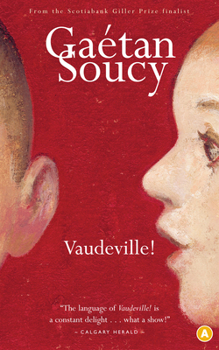Vaudeville!
Select Format
Select Condition 
Book Overview
Ga tan Soucy sets this acclaimed novel in a parallel-universe New York, just before the great stock market crash of 1929. Xavier X. Mortanse is an apprentice demolition worker who believes he's an immigrant from Hungary. By the time Xavier finds a singing frog in a miniature coffin, tries his luck on the vaudeville stage, and upsets a grandmaster chess match, Soucy has seduced readers into a netherworld of unforgettable eccentrics that riffs on chaos,...
Format:Paperback
Language:English
ISBN:088784782X
ISBN13:9780887847820
Release Date:November 2007
Publisher:House of Anansi Press
Length:440 Pages
Weight:1.07 lbs.
Dimensions:1.1" x 5.2" x 8.0"
Customer Reviews
2 ratings
This book is and always shall be "Music-Hall!"
Published by Thriftbooks.com User , 19 years ago
The translator thought it would be funny to give the English version a French title, as the original French version had an English title. Yeah, guys, ha ha, but "Vaudeville" doesn't at all capture the nature of this book and its vision of America as echo chamber, full of noises that may sound impressive to the busy ant-people down below, but are tinny and cheap in the vastness of infinite space. Think of those widescreen movies from the 50's and 60's like Giant or Two for the Seesaw, when directors hadn't yet learned how to fill the extra space so that you got this suffocating impression of useless inflation and empty bloat. That's America; and that's Music-Hall! Soucy has described himself as a "rageaholic" and it's true, there are many passages in this book where you can practically see the veins bulging on the author's forehead. He has a way of setting up lots of details and potential byways for the story to follow, and then just terminating them all with one brief, scarifying scene, leaving you with an impression of unquenchable cosmic fury, of God's waste. The larger structure of the book itself ( *** SPOILER ALERT*** DON'T READ THE REST OF THE PARAGRAPH UNTIL YOU'VE READ THE BOOK ) follows this M.O. to disorienting effect, and Soucy, after setting up a gallery of vivid, colorful personalities who you think are going to partake in lots of adventures a la a long-running T.V. serial or a Dickens novel, drops everything and everyone midway through except for the lead character and holy innocent Xavier Mortanse. The book then becomes a sort of compulsive, metronomic death march for Xavier and for the world itself, one that feels all too real, no matter how outlandish the plot gets. Imagine a bad dream where you're watching a Bugs Bunny cartoon as a child, and instead of foiling Elmer Fudd's plans and making wisecracks, Bugs is slowly dying of a gangrenous, infected rifle blast to the nose and mouth, and you'll have a simplistic notion of how perfectly this book captures the horrible new kind of death -- more horrible because unreal and cartoonish, covered up and swept away with ballyhoo and tickertape -- that America has perfected, and which, I fear, will come to characterize the hellishness of our new century. America works on the principle of the movie sequel when it comes to war and death: It has to be bigger, louder and more awe-inspiring than what came before, and World War II must be made to look like a tempest in a teapot. But will a higher form of being ( not exactly human ) emerge from the wreckage? A thing of shreds and patches, perhaps, but knowing how to absorb fear into itself in order to protect the little girls? A new kind of savior, part actor, part scarecrow, warding off the feasters of carrion? Soucy seems to think so. This is one of the most devastating books I've ever encountered, in a league with Djuna Barnes's Ryder, Villiers de l'Isle-Adam's Axel, Russell Hoban's Pilgermann, Melville's The Confidence Man a
Checkmate
Published by Thriftbooks.com User , 20 years ago
I'm not usually taken by "postmodern" fiction nor by "magical realism", which seems neither magical nor realistic to me. This novel is a bit of an exception because it's not so heavy-handed in its absurdist "magical" (so called) interludes. But, above all, I liked this book because it was fun to read. Soucy manages not to go off the cliff with the absurdist elements, and life is, after all, more than a bit absurd at times. The notes attached to the end of my edition of the book compare it to Mary Shelley's Frankenstein. Thematically, this is true. The problem is that, unlike Frankenstein, one doesn't have much of a clue as to what constitutes the theme until the tag end of the book. I think a better comparison, based on the books stylistic merits, is to Marquez. But the book is really too sui generis for any pat comparison of this sort. It's too real for Magical Realism, and too random to compare to any Victorian novel. Reading it, I was reminded of "probability waves" that graduate students in physics deal in. On some exams they are required to calculate the likelihood that they will appear on the other side of the wall which they are abutting.-Ahem, it's a very small number-In short, this book does manage to portray without the "giggle factor" in most books of this sort, our world, "...this hell capable of all manner of wonders."----Chess addicts will probably fancy it as well.






